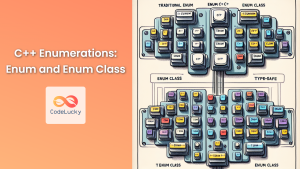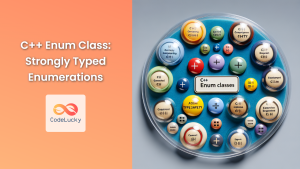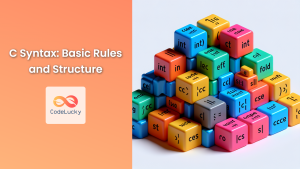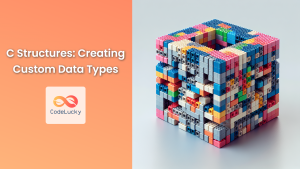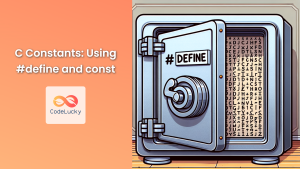In the world of C programming, enumerations (often called enums) are a powerful tool for creating named integer constants. They provide a way to define a set of named values, making your code more readable, maintainable, and less prone to errors. In this comprehensive guide, we'll dive deep into C enumerations, exploring their syntax, usage, and best practices.
What are Enumerations?
Enumerations in C are user-defined data types that consist of a set of named integer constants. They allow you to create a list of related symbolic names, each associated with a unique integer value. This feature is particularly useful when you need to represent a fixed set of options or states in your program.
Let's start with a simple example:
enum Days {
SUNDAY,
MONDAY,
TUESDAY,
WEDNESDAY,
THURSDAY,
FRIDAY,
SATURDAY
};
In this example, we've created an enumeration called Days with seven named constants representing the days of the week. By default, C assigns integer values to these constants starting from 0. So, SUNDAY is 0, MONDAY is 1, and so on.
Declaring and Using Enumerations
To use an enumeration, you need to declare a variable of the enum type. Here's how you can do it:
#include <stdio.h>
enum Days {
SUNDAY,
MONDAY,
TUESDAY,
WEDNESDAY,
THURSDAY,
FRIDAY,
SATURDAY
};
int main() {
enum Days today = WEDNESDAY;
printf("Today is day number %d\n", today);
return 0;
}
Output:
Today is day number 3
In this example, we declared a variable today of type enum Days and assigned it the value WEDNESDAY. When we print today, we see the integer value 3, which is the default value assigned to WEDNESDAY in the enumeration.
Custom Integer Values in Enumerations
While C automatically assigns integer values starting from 0, you can also specify custom values for enum constants. Let's modify our Days enum to start the week on Monday:
#include <stdio.h>
enum Days {
MONDAY = 1,
TUESDAY,
WEDNESDAY,
THURSDAY,
FRIDAY,
SATURDAY,
SUNDAY
};
int main() {
enum Days today = WEDNESDAY;
printf("Today is day number %d\n", today);
return 0;
}
Output:
Today is day number 3
In this case, we explicitly set MONDAY to 1. C then automatically assigns the subsequent values incrementally. So, TUESDAY becomes 2, WEDNESDAY 3, and so on.
Enumerations and Switch Statements
Enumerations work exceptionally well with switch statements, allowing you to create clear and readable code for handling different cases. Here's an example:
#include <stdio.h>
enum TrafficLight {
RED,
YELLOW,
GREEN
};
void handleTrafficLight(enum TrafficLight light) {
switch (light) {
case RED:
printf("Stop! 🛑\n");
break;
case YELLOW:
printf("Prepare to stop ⚠️\n");
break;
case GREEN:
printf("Go! 🟢\n");
break;
default:
printf("Invalid traffic light color!\n");
}
}
int main() {
enum TrafficLight currentLight = YELLOW;
handleTrafficLight(currentLight);
return 0;
}
Output:
Prepare to stop ⚠️
This example demonstrates how enumerations can make your code more readable and self-documenting. The handleTrafficLight function clearly shows what action to take for each traffic light color.
Enumerations as Array Indices
Enumerations can be particularly useful when working with arrays. They provide a convenient way to index into arrays without using "magic numbers". Here's an example:
#include <stdio.h>
enum Months {
JAN, FEB, MAR, APR, MAY, JUN,
JUL, AUG, SEP, OCT, NOV, DEC
};
int main() {
int daysInMonth[] = {31, 28, 31, 30, 31, 30, 31, 31, 30, 31, 30, 31};
enum Months month = APR;
printf("Number of days in April: %d\n", daysInMonth[month]);
return 0;
}
Output:
Number of days in April: 30
In this example, we use the Months enum to index into the daysInMonth array. This makes the code more readable and less error-prone compared to using numeric indices directly.
Typedef with Enumerations
You can use typedef with enumerations to create a new type name, which can make your code even more concise:
#include <stdio.h>
typedef enum {
NORTH,
SOUTH,
EAST,
WEST
} Direction;
void move(Direction dir) {
switch (dir) {
case NORTH: printf("Moving North ⬆️\n"); break;
case SOUTH: printf("Moving South ⬇️\n"); break;
case EAST: printf("Moving East ➡️\n"); break;
case WEST: printf("Moving West ⬅️\n"); break;
}
}
int main() {
Direction playerDirection = EAST;
move(playerDirection);
return 0;
}
Output:
Moving East ➡️
By using typedef, we can now declare variables of type Direction directly, without needing to use the enum keyword each time.
Enumerations and Bitwise Operations
Enumerations are often used with bitwise operations to create flags or options. This is particularly useful when you want to combine multiple options. Here's an example:
#include <stdio.h>
typedef enum {
READ = 1 << 0, // 0001
WRITE = 1 << 1, // 0010
EXECUTE = 1 << 2 // 0100
} FilePermission;
void printPermissions(int permissions) {
printf("Permissions: ");
if (permissions & READ) printf("Read ");
if (permissions & WRITE) printf("Write ");
if (permissions & EXECUTE) printf("Execute");
printf("\n");
}
int main() {
int filePerms = READ | WRITE; // 0011
printPermissions(filePerms);
filePerms |= EXECUTE; // Add execute permission
printPermissions(filePerms);
return 0;
}
Output:
Permissions: Read Write
Permissions: Read Write Execute
In this example, we use bitwise operations to combine and check file permissions. Each permission is represented by a bit in the FilePermission enum.
Enumerations across Multiple Files
When using enumerations across multiple files in a project, it's a good practice to declare them in a header file. This ensures consistency and makes it easier to maintain your code. Here's an example:
colors.h
#ifndef COLORS_H
#define COLORS_H
typedef enum {
RED,
GREEN,
BLUE,
YELLOW,
PURPLE
} Color;
#endif
main.c
#include <stdio.h>
#include "colors.h"
void printColor(Color c) {
switch (c) {
case RED: printf("Red 🔴\n"); break;
case GREEN: printf("Green 🟢\n"); break;
case BLUE: printf("Blue 🔵\n"); break;
case YELLOW: printf("Yellow 🟡\n"); break;
case PURPLE: printf("Purple 🟣\n"); break;
}
}
int main() {
Color favoriteColor = BLUE;
printColor(favoriteColor);
return 0;
}
Output:
Blue 🔵
By declaring the Color enum in a separate header file, we can easily use it in multiple .c files while maintaining a single source of truth for the enum definition.
Best Practices for Using Enumerations
-
Use Meaningful Names: Choose clear and descriptive names for your enumerations and their constants. This improves code readability.
-
Avoid Duplicate Values: Unless you have a specific reason, avoid assigning the same value to multiple enum constants.
-
Use Enums for Related Constants: Group related constants into enumerations. This provides better organization and context.
-
Consider Using Typedef: Using typedef with enums can make your code more concise and easier to read.
-
Be Cautious with Explicit Values: When assigning explicit values to enum constants, be aware of potential conflicts or unintended consequences.
-
Use Enums in Switch Statements: Enums work great with switch statements, providing compile-time checks for completeness.
-
Document Your Enums: If the purpose of an enum or its constants isn't immediately clear, add comments to explain their usage.
Conclusion
Enumerations in C are a powerful feature that can significantly improve the clarity and maintainability of your code. They provide a way to create named constants, making your code more self-documenting and less prone to errors. Whether you're representing days of the week, color choices, or complex state machines, enumerations offer a clean and efficient solution.
By mastering the use of enumerations, you'll be able to write more robust and readable C code. Remember to choose meaningful names, group related constants, and leverage enums in switch statements and bitwise operations where appropriate. With these techniques in your toolkit, you'll be well-equipped to tackle a wide range of programming challenges in C.


